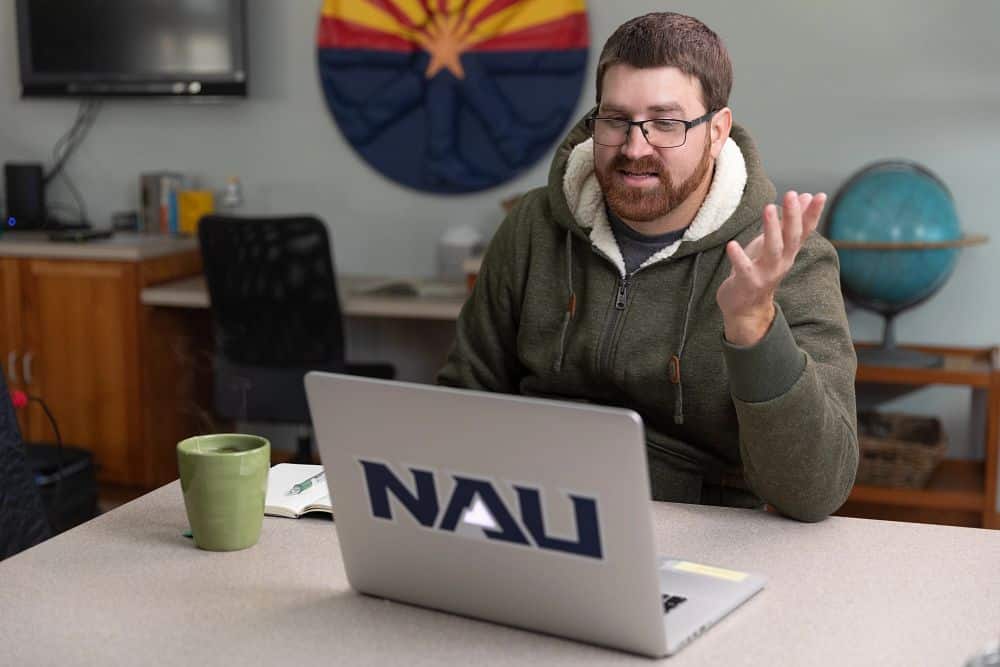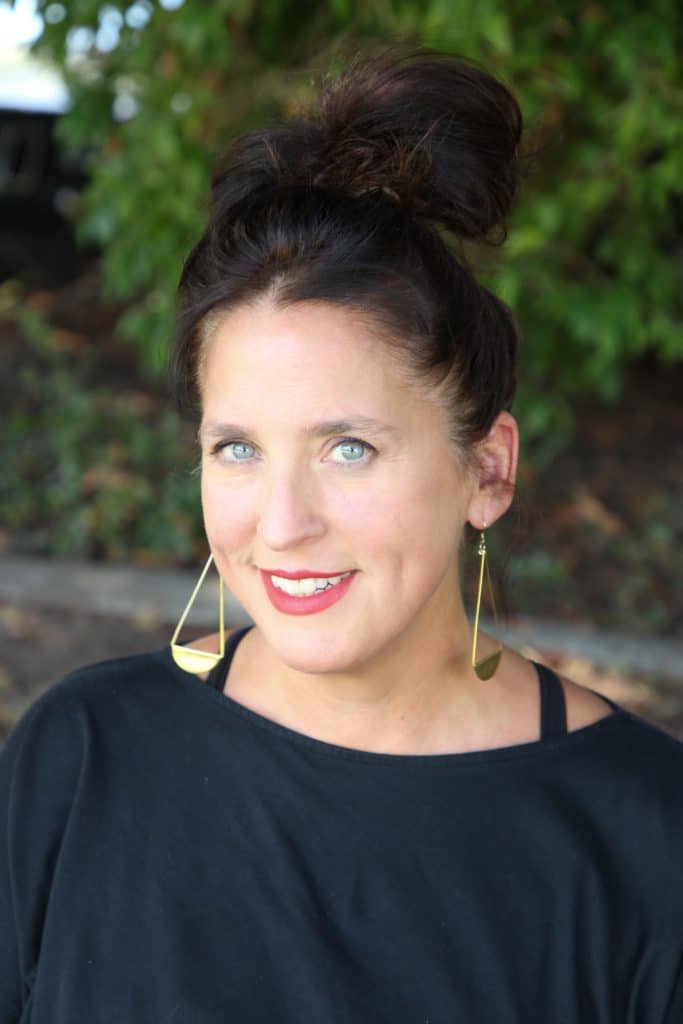 By Jayme Davis
By Jayme Davis
Program coordinator and lead faculty, Personalized Learning Liberal Arts program
In addition to her experience teaching online students and her experience teaching in the Department of Comparative Cultural Studies, Davis is an online student in a doctoral program. For National Online Learning Day, she writes about how important a global online classroom is for democracy and equity.
I have been teaching online in NAU’s Personalized Learning program for nearly 10 years, and now, for the first time in as many years, I am an online student in an Ed.D. program. But I have been an advocate of “distance education” and what has evolved into “online education” since I was an undergraduate philosophy major at NAU in the 1990s. I remember taking my seat on the first day of Philosophy in Literature, cracking open my notepad, uncapping my pen and watching in astonishment as the teacher turned on two enormous screens to reveal the rest of our classmates who were “logging in” via satellite from remote locations across the state. By the end of that first class, I remember thinking: “This is why I wanted to go to college!”
That course left a tremendous impression on me because it connected people unlikely to meet in other contexts. I encountered a wealth of ideas and perspectives that may not have been as available to me in a traditional, face-to-face classroom, and this experience motivated me to become an online professor. What was a relatively rare and innovative educational experience in the ‘90s is now a mainstream educational modality. According to the National Center for Educational Statistics (2023), more than half of students have taken at least one online course, about one-third of undergraduates exclusively take online courses, and most students who take online courses take them from within the state they reside.
Online degree programs like Personalized Learning create access to education for students previously precluded by distance, cost or circumstance, and as importantly, they create access to the breadth of ideas born of varied life experiences and different social contexts. In Not for Profit: Why Democracy Needs the Humanities, philosopher Martha Nussbaum argues that access to education is a necessity, not a luxury. She avers, “No system of education is doing a good job if its benefits reach only wealthy elites. The distribution of access to quality education is an urgent issue in all modern democracies (p. 9).” In a democracy, it’s vital that the ability to critically engage with the world is not limited to a select few. If access to the education that fosters these skills becomes more limited, we become more likely to produce a society that is less equipped to grapple with complex societal challenges. A society in which only a small elite have the skills to critically engage with the world around them is likely to be more fragmented, less understanding and ultimately less democratic.
For many of my students, access to education didn’t necessarily come easily, and if it weren’t for our flexibly paced online degree options, they wouldn’t have an opportunity to pursue degrees. The beauty of asynchronous online learning is its ability to stretch across time and space. It’s not merely about attending a class without the commute; it’s about access to a virtual classroom that transcends geographic and temporal barriers and allows you to access humans, ideas and perspectives you might otherwise miss. It is precisely this “at different times…in different places” of asynchronous, online learning that is responsible for some of the most magical elements of this experience.
What is Personalized Learning?
NAU’s PL program is unique in that it is flexibly paced and competency-based. Students complete as many units as they can during a fixed-price, 6-month subscription; they can accelerate their pace when they have more time or can draw from prior experiences to move more quickly through a set of courses. Just as importantly, they can work more slowly or take small breaks as needed to accommodate the demands of work, family life and other commitments. Our program does not have due dates outside of the subscription’s end, so learners can spend more time on courses that require more effort for them and less time on those that don’t. We are competency-based in that our learners are assessed via personalized projects, assignments and tests that are designed to measure what they can do with what they learn and not just what they know.
Why online learning matters
Online learning creates access to quality education for students who cannot commute to campus for face-to-face classes, and our competency-based program levels the playing field even further by extending education to those whose schedules do not permit them to work within a standard academic term. For example, one of my students, a mother of two young children and a survivor of intimate partner violence, typed most of her essays with one hand in the middle of the night while nursing her child. She graduated from PL with a 4.0 and earned a full scholarship to law school to further her goal of advocating for those who have survived abuse. I have had students who worked toward their degrees while living in their cars and logging in from public libraries. I have had students who were told that they were “not smart enough for college” who found their voices and flourished in our program, including one stellar student who had dropped out of college when she was told she “didn’t have what it takes” and graduated from NAU at the age of 76, just to prove them wrong. Another learner worked on courses from his night shift as a custodian and went on to graduate school to pursue his dream of becoming a historical archivist. Education is a transformational experience, and online courses make it possible for a wider range of people who would not otherwise have access to it to pursue their goals and fully become who they want to be.
I leverage the education in philosophy I received from NAU every day in my work. What one knows profoundly influences what one can do; thus, making education accessible is a moral imperative. I am fortunate to hold the position I do because it allows me to work with people who might not otherwise access higher education: people who are curious about what they can do and who they can become. Now, for the first time in my life, I am experiencing this learning experience from the other side of the online teacher-learner dynamic. Just as learners in my virtual classrooms have introduced me to so many different perspectives, I am feeling this expansion directly as I make friends with my classmates, exchange ideas and get new perspectives on what it means to teach and learn in the 21st century. Online education creates access not only to institutions of higher learning but also to new worlds and novel possibilities. And this is why online education blows my mind.
Learn more about the degree and certificates available through NAU Online.




 By Jayme Davis
By Jayme Davis